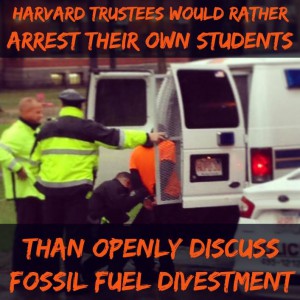This week, the national fossil fuel divestment movement escalated, as student blockades popped up at Harvard and Washington University in St. Louis. By the end of the week, 8 students had been arrested across the two campuses, the first arrests since the fossil fuel divestment campaign launched nearly two years ago.
 The skirmish at Harvard touched off Wednesday, where students organized as Divest Harvard have been pushing the university to get rid of the oil, gas, and coal holdings in its $33 billion endowment. Harvard’s president, Drew Faust, has dug in against Divest Harvard’s demands, even denying that the fossil fuel industry is blocking meaningful action to address climate change. Facing an administration that refuses to distance itself from the fossil fuel corporations driving climate crisis, Divest Harvard launched a blockade of President Faust’s office that lasted more than 24 hours. On Thursday morning, Harvard University police arrested undergraduate Brett Roche — the first arrest in the national divestment movement. Roche’s arrest marks an increasingly hardline response from Harvard’s administrators, as the university demonstrates a willingness to use police force to defend investment in fossil fuel corporations.
The skirmish at Harvard touched off Wednesday, where students organized as Divest Harvard have been pushing the university to get rid of the oil, gas, and coal holdings in its $33 billion endowment. Harvard’s president, Drew Faust, has dug in against Divest Harvard’s demands, even denying that the fossil fuel industry is blocking meaningful action to address climate change. Facing an administration that refuses to distance itself from the fossil fuel corporations driving climate crisis, Divest Harvard launched a blockade of President Faust’s office that lasted more than 24 hours. On Thursday morning, Harvard University police arrested undergraduate Brett Roche — the first arrest in the national divestment movement. Roche’s arrest marks an increasingly hardline response from Harvard’s administrators, as the university demonstrates a willingness to use police force to defend investment in fossil fuel corporations.
Brett Roche may have been the first divestment activist arrested on campus this week, but he certainly wasn’t the last. This morning, Washington University in St. Louis joined Harvard in infamy: seven students were arrested as they attempted to deliver a letter to the university’s board of trustees. Just days before, WashU Students Against Peabody ended a historic 17-day sit-in which demanded that Greg Boyce, notorious CEO of Peabody Energy, the world’s largest private coal company, be removed from the university’s board. During negotiations, Washington University chancellor Mark Wrighton flatly refused to respond to students demands. When asked to exercise leadership, he replied “I can, but I won’t.” Faced with an administration content to cozy up to fossil fuel interests, more than 100 students staged a peaceful sat-in outside Washington University’s board meeting under the watchful eyes of police, some of whom carried shields and riot gear. When a delegation of students attempted to enter the building to deliver a letter to Washington University’s board, they were arrested. All seven were charged with trespassing on their own campus.
 The implications of this week of action are both scary and heartening. Novelist Margaret Atwood spoke to the scary, criticizing the administration’s response as she received an award at Harvard yesterday: “Any society where arrest is preferable to open dialogue is a scary place.” Indeed, university administrators at both Harvard and Washington University appear to be so committed to the fossil fuel industry that they’ll arrest their own students for speaking out.
The implications of this week of action are both scary and heartening. Novelist Margaret Atwood spoke to the scary, criticizing the administration’s response as she received an award at Harvard yesterday: “Any society where arrest is preferable to open dialogue is a scary place.” Indeed, university administrators at both Harvard and Washington University appear to be so committed to the fossil fuel industry that they’ll arrest their own students for speaking out.
On the hopeful side, the student divestment movement is finding its power. After two years of power-building and by-the-book advocacy, campus climate activists are proving that they have the courage to stand up to their administrators and the fossil fuel industry. Earlier in the school year, students at Harvard, Washington University, and dozens of other campuses worked with Rainforest Action Network to disrupt campus recruitment sessions organized by Bank of America and Citi, two of the largest financiers of the U.S. coal industry. Those actions, and the arrests this week, point to a rising tide of resistance that won’t be cowed by police response. A longer, deeper struggle is opening on campuses across the country, and administrators at the more than 300 universities with active divestment campaigns need to know that their chickens are coming home to roost. It’s time to divest or expect resistance.
To support the Washington University in St. Louis students arrested this morning, call Chancellor Mark Wrighton at (314) 935-5100.
Tell him universities are for students, not for coal CEOs. Washington University needs to drop Peabody Energy so the school can get back to educating students, not arresting them.